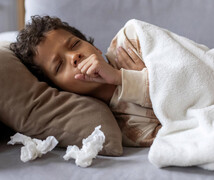You've got a checklist for school supplies, but what steps should you take to make sure your child is in good health for the start of school? Here, Duke Health pediatrician, Jordan Reasor, MD, shares her top tips to make sure your child is healthy for back to school and beyond.
Schedule An Annual Physical
Dr. Reasor recommends school-aged children have at least one well visit or physical each year with their pediatrician. Though your child’s physical doesn’t have to be before school starts, it’s a great time to schedule one. An annual physical gives your pediatrician the opportunity to make sure your child is staying healthy, growing properly, and sleeping and eating well. “We also examine hearing and vision, which are usually things schools look for to make sure there aren’t barriers to learning,” she said.
If your child plays school sports, a sports physical is usually required before the start of school or season. Sports physicals can be performed by your pediatrician or by a sports medicine primary care physician -- a primary care doctor with additional training and board certification in sports medicine.
Stay Up to Date on Immunizations
Schools require proof that children are up to date on immunizations. The North Carolina Department of Health and Human Services requires certain immunizations for your child to attend school. Many are given when a child enters kindergarten, seventh grade, and again in 12th grade.
“Before a child starts kindergarten, we want to make sure they are up to date on vaccines such as polio, diphtheria, tetanus, pertussis, measles, mumps, rubella, chicken pox, and a few others,” said Dr. Reasor. When children enter seventh grade, she explains they should get boosters for things like tetanus, diphtheria, and pertussis. In addition, children going into seventh grade will receive their first dose of the meningitis vaccine. The last dose is usually given in 12th grade. Those are required vaccinations, but Dr. Reasor recommends your child also receive a yearly flu shot and COVID-19 vaccine to help protect them from getting sick.
Duke Health pediatrician Dr. Jordan Reasor explains the importance of childhood vaccinations as kids head back to school.
Teach the Importance of Hygiene to Prevent Illness
Going back to school means there are more germs going around, and kids are more likely to get sick with colds and viruses. “Parents can make sure that their kids are healthy by staying up to date on those vaccines but also by making sure their children are washing their hands,” Dr. Reasor said. She recommends packing hand sanitizer for times when soap and water are not available.
Set a Sleep Schedule
Summertime leads to more relaxed schedules, including when your child goes to sleep and when they wake up. As time creeps closer to the new school year, consider getting your child back into a sleep routine so they’re well rested for the start of school.
“It's really important for parents to think about the transition back into school routines,” said Dr. Reasor. Enforcing a bedtime to make sure your kids are getting the necessary hours of sleep each night will make for a smoother transition. According to the American Academy of Pediatrics, grade-schoolers age 6 to 12 need nine to 12 hours of sleep each day (this includes naps), while teenagers need between eight to 10 hours of sleep.
Get Moving
In children, movement can lead to better learning and memory, improve mood and anxiety; and boost overall health. While it’s recommended children and adolescents do 60 minutes or more of physical activity each day, it doesn’t have to be all at once. Even 10 minutes at a time is beneficial.
“Joyful movement is the key,” Dr. Reasor stresses. “Nobody likes to be told to go exercise, so if they enjoy walking the dog, having a dance party, or playing tag, it's joyful movement we really want to focus on.”
Gear Up with Breakfast
Ensure each day is a success by providing breakfast. “It takes a lot of brain power to think and learn,” said Dr. Reasor. “If we're not fueling that brain with a good breakfast, it can lag behind and make it harder to pay attention.”




